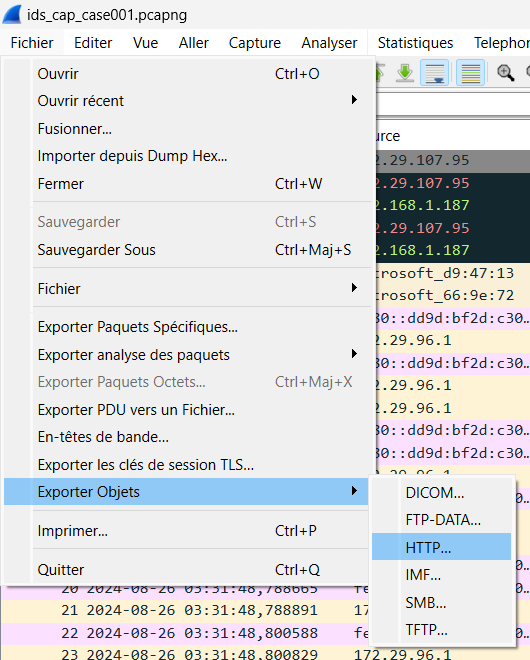Exfiltration In The Code
📜Scenario

🔎Solve
Dans un premier temps, on extrait les objets http afin de traiter les éléments échangés plus facilement :


L'objet password contient le mot de passe utilisé par le client pour chiffrer l'archive qu'il va envoyer au serveur
$ ls ../../Exfiltration_is_the_key/srv/srv/chall/
password upload 'upload(1)'
$ cat password
{"password": "0vK0b7aDIFZ2Y4kV", "aes_key": "670f0b6506664804694ec261fc0a0db459229e35527c67f7e35f20db1706b156", "iv": "747061614a77664f63325a67756a4941"}
$ cat upload\(1\)
File received and saved.
Le fichier upload contient le zip chiffré avec de l'AES
On déchiffre avec le script python suivant en remplaçant encrypted_file_path, la clé AES et l'iv par les bonnes valeurs.
import os
import zipfile
import io
from Crypto.Cipher import AES
from Crypto.Util.Padding import unpad
def decrypt_and_unzip(encrypted_file_path, aes_key_hex, iv_hex):
# Convert the AES key and IV from hex to bytes
aes_key = bytes.fromhex(aes_key_hex)
iv = bytes.fromhex(iv_hex)
# Ensure the key and IV lengths are correct
assert len(aes_key) == 32, f"AES key length is {len(aes_key)}, expected 32 bytes."
assert len(iv) == 16, f"IV length is {len(iv)}, expected 16 bytes."
# Read the encrypted data from the file
with open(encrypted_file_path, 'rb') as f:
encrypted_data = f.read()
# Initialize AES cipher for decryption using the key and IV
cipher = AES.new(aes_key, AES.MODE_CBC, iv)
try:
# Decrypt the data
decrypted_data = unpad(cipher.decrypt(encrypted_data), AES.block_size)
# Use BytesIO to handle the decrypted zip data
zip_buffer = io.BytesIO(decrypted_data)
# Extract the zip file contents
extraction_dir = 'extracted_contents'
os.makedirs(extraction_dir, exist_ok=True)
with zipfile.ZipFile(zip_buffer, 'r') as zip_ref:
zip_ref.extractall(extraction_dir)
return extraction_dir
except ValueError as e:
print(f"Error during decryption: {e}")
return None
# Example usage:
if __name__ == "__main__":
# Example path to the encrypted file
encrypted_file_path = 'received_exfiltration.zip' # Replace with actual path to the encrypted file
# AES key and IV provided (replace with actual values)
aes_key_hex = "670f0b6506664804694ec261fc0a0db459229e35527c67f7e35f20db1706b156"
iv_hex = "747061614a77664f63325a67756a4941"
# Decrypt and unzip the received data
extracted_dir = decrypt_and_unzip(encrypted_file_path, aes_key_hex, iv_hex)
if extracted_dir:
print(f"Files extracted to: {extracted_dir}")
else:
print("Decryption failed.")
On obtient 5 fichier png qui sont en fait de la data, en reconstruisant la base64, à l'aide de cyberchef, par exemple, on obtient un zip.
$ cat extracted_contents/*
�PNG
␦
UEsDBBQAAAAIALeu1VifoOYF7wAAAAICAAAQABwAYWNjZXNzX2NvZGVzLnR4dFVUCQADqS52ZqkudmZ1eAsAAQToAwAABOgDAAB1kTtOxDAQhvuc�PNG
␦
YiSKLSFxnnSwokDaYiUk+sEZwCKyw9jeM5GeG/hiTFgKQI5lF/P4NP/8PjoOBOOObOC0EMxsrDYzTlQUIGfvxrWMWqcPD9dQ91V5URQPOE2SJw+e�PNG
␦
+ESRfb59aFQn7Qd8cozBGV4hYNKvxPLyUFt31a8ZoN0q7vMc+LToyCakJQ/3qmwFvo1MGGGUK0N1EIn5/mq4qv8shCLMnGhjobJr1D9tz2lhsprg�PNG
␦
8f64oalSg0A351hsCJeBmNH7LZfbvhHg7udTpDgjvxn7At7Fb9TYPNkM9arv4DROEMRna97jxpRODeLzF1BLAQIeAxQAAAAIALeu1VifoOYF7wAA�PNG
␦
AAICAAAQABgAAAAAAAEAAACkgQAAAABhY2Nlc3NfY29kZXMudHh0VVQFAAOpLnZmdXgLAAEE6AMAAAToAwAAUEsFBgAAAAABAAEAVgAAADkBAAAA
Une fois dézippé on obtient le fichier avec les codes d'accès
$ cat access_codes.txt
Porte d'entrée principale
Code d'accès : 4821#
Salle des serveurs
Code d'accès : 9537#
Laboratoire de recherche
Code d'accès : 6472#
Salle de contrôle de sécurité
Code d'accès : 8316#
Bureau du directeur
Code d'accès : 2904#
Salle des archives
Code d'accès : 1753#
Salle de conférence VIP
Code d'accès : 8239#
Accès toit/terrasse
Code d'accès : 4685#
Entrée de parking souterrain
Code d'accès : 5943#
Local technique
Code d'accès : 7392#
Flag : NBCTF{4685#|8316#}




